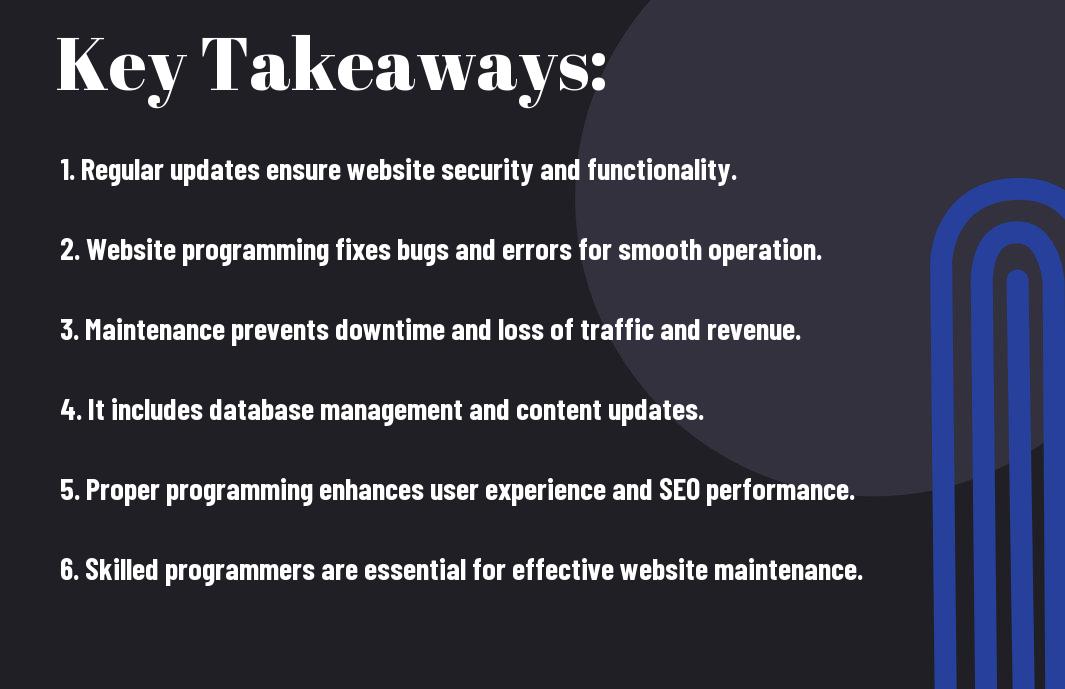Ensuring the efficiency and effectiveness of your website requires a deep understanding of the role of website programming in website maintenance. From detecting and fixing bugs to improving site functionality, website programming plays a crucial role in maintaining a high-quality, user-friendly website. In this blog post, you will gain insight into the importance of website programming in website maintenance and learn how it can directly impact the success of your online presence. Whether you are a website owner or a developer, understanding the critical role of website programming is essential in keeping your website at its best.
Key Takeaways:
- Effective website programming is crucial for ensuring smooth website maintenance and ongoing functionality.
- Regular updates and maintenance of website programming are essential to address security vulnerabilities and improve user experience.
- Quality website programming can contribute to faster loading times, improved SEO, and enhanced overall performance.
- Professional website developers can help in identifying and fixing programming errors, ensuring a seamless user experience.
- Understanding website programming allows web owners to make informed decisions and effectively communicate their needs with developers.

 Web Programming Basics
Web Programming Basics
Some of the key components of website maintenance involve web programming. This is the process of creating, designing, and maintaining websites using programming languages, database technologies, and other tools. This chapter will cover the basics of web programming and its role in website maintenance.
Understanding Coding Languages
When it comes to web programming, it’s important to have a clear understanding of coding languages. These languages are used to create the structure, design, and functionality of a website. Some common coding languages include HTML, CSS, JavaScript, PHP, and Python. Each language serves a specific purpose, and understanding how they work together can help you maintain and update your website more effectively. It’s crucial to stay updated with the latest trends and best practices in coding languages to ensure your website is secure, functional, and user-friendly.
Frontend vs Backend Development
In web programming, there are two main areas of development: frontend and backend. Frontend development focuses on the client-side of the website, which includes the design, layout, and user interface. On the other hand, backend development deals with the server-side of the website, managing database connections, server configuration, and the overall functionality of the website. Understanding the difference between frontend and backend development is essential in maintaining a well-functioning website, as it allows you to identify and address issues on both the user-facing and server sides.
Essential Programming Skills for Maintenance
Keep in mind that website maintenance involves a lot of programming, so having essential programming skills is crucial. Being able to understand and modify code is essential for keeping your website running smoothly. You need to be familiar with languages such as HTML, CSS, and JavaScript, as well as backend languages like PHP or Ruby on Rails. Additionally, having knowledge of databases and server-side technologies will be beneficial for troubleshooting and optimizing your website.
If you want to learn more about website maintenance, you can check out this comprehensive guide on Website Maintenance: Everything You Need to Know.
Debugging Techniques
When it comes to debugging, the ability to identify and resolve issues in your website’s code is essential. You need to be skilled at using debugging tools and techniques to find and fix errors. This involves checking for syntax errors, logic errors, and other issues that may be causing your website to malfunction. Understanding how to use browser developer tools and logging techniques can be immensely helpful in identifying and troubleshooting issues. Proper debugging can prevent potential security vulnerabilities and maintain the overall performance of your website.
Code Optimization Strategies
Optimizing your code is crucial for ensuring that your website runs efficiently and loads quickly. This involves minimizing file sizes, reducing the number of HTTP requests, and implementing caching techniques. By optimizing your code, you can improve the user experience, enhance SEO performance, and reduce server load. Additionally, you need to stay updated with the latest optimization techniques and best practices to ensure that your website remains competitive and responsive. Code optimization strategies are essential for maintaining a high-performing website.
Advanced Maintenance Through Programming
After establishing a solid foundation for your website through basic programming, you can take your maintenance to the next level with advanced programming techniques. This will enable you to keep your website running smoothly and securely over the long term.
- Implementing security updates to protect your website from potential vulnerabilities. Is ongoing maintenance of a website part of the role …
- Automating maintenance tasks to save time and ensure consistent performance.
| Security Updates | Automating Maintenance Tasks |
| Keeping up with security updates is crucial to safeguarding your website from potential threats such as malware and hacking attempts. | Automating routine maintenance tasks such as backups and software updates can help keep your website running smoothly without requiring constant manual intervention. |
Implementing Security Updates
When it comes to maintaining your website, implementing security updates is a critical aspect of ensuring its ongoing protection. Regularly updating your website’s software, plugins, and scripts will help to address any potential security vulnerabilities and keep your website secure. Failure to stay on top of security updates can leave your website exposed to various risks, including unauthorized access and data breaches. By prioritizing security updates, you can better protect your website and the data of your users from potential threats.
Automating Maintenance Tasks
Automating maintenance tasks is a smart way to streamline the upkeep of your website. By automating routine tasks such as backups, software updates, and security scans, you can ensure that these essential maintenance activities are consistently performed without relying on manual intervention. This not only saves you time and effort but also helps to maintain the overall health and performance of your website. Additionally, automation reduces the risk of human error, ensuring that maintenance tasks are carried out reliably and consistently. By automating maintenance tasks, you can effectively manage your website’s upkeep while freeing up time to focus on other aspects of your online presence.
Best Practices in Programming for Maintenance
To ensure the smooth functioning and longevity of your website, it is essential to adhere to best practices in website programming for maintenance. This requires a proactive approach to coding that anticipates potential issues and facilitates the ongoing maintenance and updates necessary to keep your website running optimally. You need to understand the importance of website maintenance and how it affects your business. To learn more about Why Website Maintenance Is Necessary After Development, visit Why Website Maintenance Is Necessary After Development.
Documentation and Commenting Code
Documentation and commenting code is crucial for effective website maintenance. Proper documentation provides a roadmap for anyone working with the code, helping them understand its structure, function, and purpose. Clear and concise comments also provide valuable insights into the reasoning behind specific coding decisions. When you or others revisit the code for maintenance or updates, thorough documentation and relevant comments save time and reduce the risk of errors.
Version Control and Backup Procedures
Implementing a robust version control system and regular backup procedures is another critical aspect of programming for maintenance. Version control allows you to track changes, collaborate with others, and roll back to previous versions if necessary. It provides a safety net for your codebase and helps maintain its integrity over time. Additionally, regular backups safeguard against data loss, ensuring that you can easily restore your website to a previous state in the event of an unexpected issue.
Conclusion
With these considerations in mind, it is clear that website programming plays a crucial role in the maintenance of a website. Understanding the importance of updating and debugging your code, as well as continuously optimizing your website for performance and security, is essential for ensuring that your website functions smoothly and efficiently. By staying attentive to the various programming languages and frameworks that power your website, you can stay ahead of potential issues and provide a better user experience for your visitors. It is important to invest time and resources into ongoing website programming to maintain the functionality and relevance of your website in today’s digital landscape.
FAQ
Q: What is the role of website programming in website maintenance?
A: Website programming plays a crucial role in website maintenance as it involves the implementation of updates, bug fixes, and security enhancements to ensure the website functions smoothly and remains secure.
Q: Why is website programming important for maintaining a website?
A: Website programming is important for maintaining a website because it allows for the implementation of new features, optimization of existing code, and addressing any technical issues that may arise, ultimately improving the overall performance and user experience.
Q: What are some common website programming languages used for website maintenance?
A: Common website programming languages used for website maintenance include HTML, CSS, JavaScript, PHP, Ruby, Python, and others, depending on the specific requirements of the website.
Q: How does website programming contribute to website security during maintenance?
A: Website programming contributes to website security during maintenance by enabling the implementation of security protocols, encryption methods, and regular security updates to protect the website from potential vulnerabilities and cyber threats.
Q: What are the best practices for integrating website programming into website maintenance?
A: Best practices for integrating website programming into website maintenance include conducting regular code reviews, utilizing version control systems, documenting changes, testing updates in a staging environment, and staying informed about the latest web development technologies and trends.



